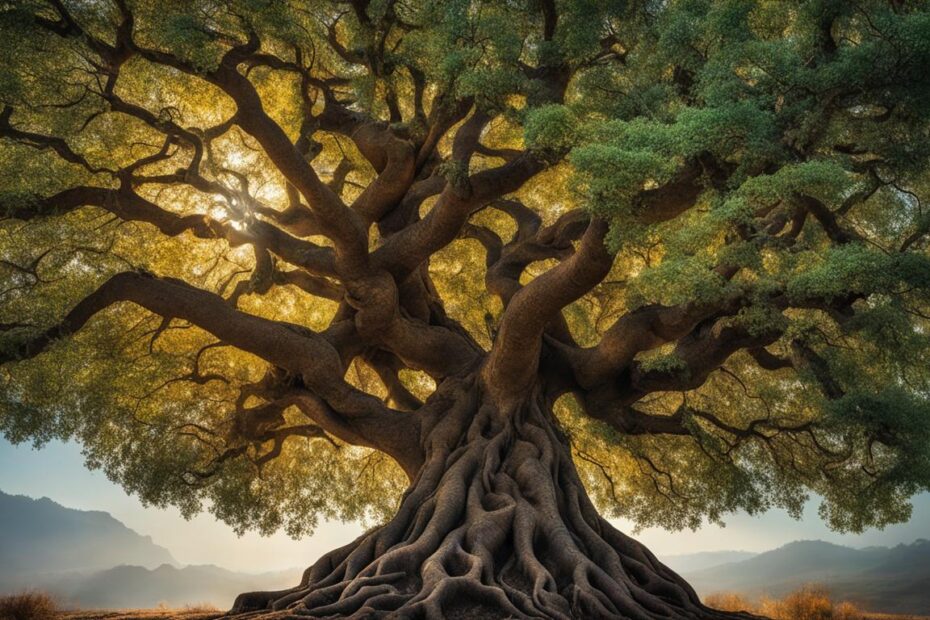Prayer, with its rich history and deep significance, has been a fundamental aspect of human spirituality for thousands of years. It serves as a means of communication with a higher power, allowing individuals to seek guidance, protection, and blessings. The origins of prayer can be traced back to ancient times, where various cultures and religions developed their own unique rituals and practices. Today, prayer continues to hold a place of importance in spiritual and religious life, offering individuals solace, strength, and a sense of meaning.
Key Takeaways:
- Prayer has a long and diverse history, spanning across cultures and religions.
- It originated as a means of communication with a higher power and seeking guidance and blessings.
- Over time, prayer practices evolved to adapt to cultural and social contexts.
- Prayer holds immense cultural and religious significance in different societies around the world.
- Through prayer, individuals find solace, strength, and a deeper connection with the divine.
The Evolution of Prayer Practices
The practice of prayer has evolved over time, adapting to the cultural and social contexts of different civilizations. In ancient times, prayer rituals often involved sacrifices, offerings, and incantations to please the gods and seek their favor. As societies progressed, prayer became more personal and focused on individual needs and desires. Different religions developed their own prayer traditions, incorporating specific gestures, postures, and recitations. Prayer has always held a spiritual significance for believers, serving as a means of expressing devotion, seeking forgiveness, finding inner peace, and fostering a deeper connection with the divine.
For centuries, prayer has been a transformative practice that transcends boundaries and brings people together. In cultures around the world, prayer has played a vital role in community gatherings, religious ceremonies, and personal reflection. The methods and rituals of prayer may vary, but the underlying intention remains the same – to communicate with the divine, express gratitude, seek guidance, and find solace in times of difficulty.
Prayer is not asking. It is a longing of the soul. It is a daily admission of one’s weakness. It is better in prayer to have a heart without words than words without a heart. – Mahatma Gandhi
Throughout history, prayer has adapted to the changing beliefs and practices of different cultures and religions. It has become a deeply personal and introspective act, allowing individuals to connect with their inner self and cultivate a sense of spirituality. Whether it is through meditation, reciting prayers, or engaging in sacred rituals, prayer remains a powerful practice that holds immense spiritual significance for believers worldwide. It continues to provide a sense of meaning, comfort, and purpose, serving as a pathway to transcendence and enlightenment.
The Spiritual Significance of Prayer
Prayer is not just a ritual or a set of words; it is a deeply spiritual practice that connects individuals to something greater than themselves. It provides a sense of divine presence, allowing individuals to experience a profound connection with the sacred. Through prayer, believers can express their devotion, seek guidance, find solace, and experience inner transformation. It is a means of surrendering to a higher power, opening oneself to divine guidance, and finding strength, peace, and clarity.
A Comparative Analysis of Prayer Practices
| Religion | Prayer Practice | Significance |
|---|---|---|
| Christianity | Reciting the Lord’s Prayer | Seeking guidance and seeking forgiveness |
| Islam | Performing Salah (Prayer) | Expressing devotion and connection with Allah |
| Hinduism | Performing Puja | Offering devotion and reverence to deities |
| Buddhism | Meditation | Attaining inner peace and enlightenment |
These examples highlight the diverse and unique prayer practices across different religions. While the methods, rituals, and focus may differ, the underlying purpose remains the same – to establish a connection with the divine, seek spiritual guidance, and find solace and meaning in life.
Prayer Across Different Cultures and Religions
Prayer is an integral part of various cultures and religions around the world. It is a practice that holds immense significance and plays a vital role in the spiritual lives of individuals. Across different cultures, prayer takes on different forms, representing the diverse ways in which people seek connection with the divine.
The Origins of Prayer
The origins of prayer can be traced back to ancient times when early civilizations sought to communicate with deities and seek their favor. The practice of prayer evolved differently in each culture, influenced by their beliefs, traditions, and customs. For example, in the Islamic faith, the practice of Salah involves specific postures and recitations, performed five times a day as a means of worship and seeking divine guidance. In Hinduism, prayer is often expressed through the ritual of Puja, where individuals offer devotion and gratitude to deities through various ceremonies and offerings.
“Prayer is not asking. It is a longing of the soul. It is daily admission of one’s weakness. It is better in prayer to have a heart without words than words without a heart.” – Mahatma Gandhi
The Significance of Prayer
Prayer serves multiple purposes within different cultures and religions. It acts as a way to seek guidance, express gratitude, find inner peace, and foster a deeper connection with the sacred. It provides individuals with a sense of solace, comfort, and strength during challenging times. Through prayer, people can find spiritual nourishment, connect with their beliefs, and experience a profound sense of transcendence.
| Religion/Culture | Prayer Practice | Significance |
|---|---|---|
| Christianity | Reciting the Lord’s Prayer | Seeking forgiveness and guidance from God |
| Buddhism | Meditation | Finding inner peace and cultivating mindfulness |
| Judaism | Reciting prayers from the Siddur | Connecting with God and expressing gratitude |
| Native American | Sacred ceremonies and rituals | Communicating with spirits and honoring ancestors |
Understanding the significance of prayer in different cultures allows us to appreciate the diverse ways in which people seek spirituality and find meaning in their lives. It emphasizes the universal human desire to connect with something greater than oneself, transcending boundaries and fostering a sense of unity.

In conclusion, prayer holds immense cultural and religious significance across different cultures and religions. It is a practice that originates from ancient traditions and continues to play a vital role in the spiritual lives of individuals. Prayer serves as a means of seeking guidance, expressing devotion, finding solace, and connecting with the divine. By exploring the origins and significance of prayer, we gain a deeper understanding of the diverse ways in which people nurture their spirituality and find meaning in their lives.
Understanding the Meaning and Significance of Prayer
Prayer holds a deep and profound meaning for individuals across cultures and religions. It is a spiritual practice that transcends language barriers, allowing believers to connect with a higher power and seek guidance, solace, and blessings. The history of prayer is an exploration of humanity’s search for meaning and purpose, spanning thousands of years and reflecting the diversity of human spirituality.
Exploring the history of prayer reveals its evolution from ancient rituals to modern traditions. Prayer rituals have adapted to cultural and social contexts, taking on different forms and practices. From sacrifices and offerings in ancient times to personal and introspective prayers in contemporary society, the purpose of prayer has remained constant – to find spiritual connection, express devotion, and seek inner peace.
“Prayer is not asking. It is a longing of the soul. It is daily admission of one’s weakness. It is better in prayer to have a heart without words than words without a heart.” – Mahatma Gandhi
The Power of Prayer in Personal Transformation
Prayer has a transformative effect on individuals, offering a pathway to personal growth and self-reflection. Through prayer, individuals can cultivate a deeper understanding of themselves, their values, and their relationship with the divine. It provides a space for introspection, allowing individuals to confront their fears, shortcomings, and desires, ultimately leading to personal transformation and spiritual awakening.
The meaning of prayer extends beyond individual growth. It fosters a sense of community, bringing people together in moments of worship, celebration, and consolation. Regardless of cultural or religious backgrounds, prayer serves as a universal language that unites believers in their shared desire for connection and transcendence. It is a source of strength and comfort, providing a sense of purpose and hope in challenging times.
Embracing the Spiritual Significance of Prayer
To truly understand the meaning of prayer, one must recognize its spiritual significance. Prayer is more than a mere recitation of words or a request for divine intervention. It is a sacred act that opens the channels of communication between individuals and the divine, allowing for a deeper connection and a sense of belonging in the universe.
Through prayer, individuals can experience the presence of a higher power and tap into a source of guidance, wisdom, and unconditional love. It offers solace in times of hardship, peace in moments of turmoil, and gratitude in times of abundance. The spiritual significance of prayer lies in its ability to transform lives, inspire compassion, and instill a sense of reverence for the divine.
- Seeking Guidance: Prayer offers a pathway for individuals to seek guidance and clarity in their lives, allowing them to make decisions in alignment with their beliefs and values.
- Finding Inner Peace: Prayer provides a sanctuary of inner peace, allowing individuals to find solace amidst the chaos of everyday life.
- Cultivating Gratitude: Prayer encourages individuals to express gratitude for the blessings in their lives, fostering a positive mindset and a sense of abundance.
- Connecting with the Divine: Prayer creates a space for individuals to connect with a higher power, nurturing a sense of wonder, awe, and reverence for the sacred.
Understanding the meaning and significance of prayer unveils its timeless relevance in the human experience. It is a powerful tool for self-discovery, spiritual growth, and the pursuit of a meaningful life. Across cultures and religions, prayer serves as a guiding light, offering solace, strength, and a profound connection to the divine.
Conclusion
Prayer has a profound and profound history that spans across cultures and religions. It is a timeless practice deeply rooted in the human desire for connection, meaning, and transcendence. From ancient rituals to modern traditions, prayer has remained a significant aspect of spiritual and religious life, offering individuals a means to express their beliefs, find solace and guidance, and cultivate a deeper connection with the divine.
Exploring the history of prayer reveals its enduring significance. Through prayer, individuals can experience comfort, strength, and a sense of purpose in their lives. It serves as a powerful tool for self-reflection and personal growth, allowing individuals to find inner peace and seek guidance from a higher power.
Understanding the history and significance of prayer helps us appreciate its power and relevance in our lives. It is a universal practice that transcends cultural and religious boundaries, providing comfort, solace, and a sense of transcendence. As we explore the history of prayer and its meaning, we gain a deeper understanding of our own spirituality and our innate desire to connect with something greater than ourselves.
Whether through ancient rituals or contemporary practices, prayer continues to hold immense value for individuals seeking a sense of meaning and purpose. It remains an integral part of human spirituality, offering a pathway to connect with the divine and find solace, strength, and guidance in our journey through life.
FAQ
What is the history of prayer?
The history of prayer dates back thousands of years and holds deep significance in various cultures and religions. It is believed to have originated as a way for individuals to communicate with a higher power and seek guidance, protection, and blessings.
How has the practice of prayer evolved over time?
In ancient times, prayer rituals often involved sacrifices, offerings, and incantations to please the gods. As societies progressed, prayer became more personal and focused on individual needs and desires. Different religions developed their own prayer traditions, incorporating specific gestures, postures, and recitations.
What is the significance of prayer in different cultures and religions?
Prayer holds immense cultural and religious significance in diverse societies around the world. From the Islamic practice of Salah to the Christian recitation of the Lord’s Prayer, prayer takes on various forms across different cultures and religions. It acts as a means of spiritual expression, community bonding, and seeking guidance or intervention from the divine.
What is the meaning and purpose of prayer?
Prayer carries different meanings and purposes for individuals, depending on their beliefs and personal experiences. It can be seen as a form of worship, a means of seeking guidance and inner peace, a way to express gratitude, a tool for self-reflection and personal growth, or a method to connect with a higher power. Through prayer, individuals may find solace, spiritual transformation, and a sense of purpose and meaning in their lives.









